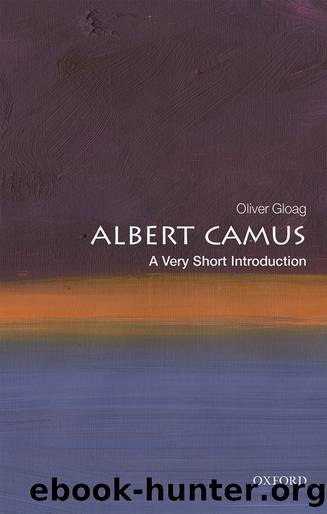Albert Camus by Oliver Gloag

Author:Oliver Gloag [Gloag, Oliver]
Language: eng
Format: epub
ISBN: 9780192511379
Publisher: OUP Oxford
Published: 2019-12-27T00:00:00+00:00
The importance of bonheur
One of the ways to face the absurd consciously is to live a life with as many moments of privileged interaction with nature as possible, moments of bonheur. Bonheur speaks to bliss, time spent in nature, under the sun, by the beach, among the ruins, when Camus felt at one with the world and freed from a sense of time. The privileged site for his feeling, aside from the Algerian sun, was the Roman ruins in Tipasa.
In an early collection of essays published in Algiers in 1938, Camus recounts a day trip to Tipasa (âNuptials in Tipasaâ). In a densely lyrical text, Camus describes his moment of supreme unity with nature, which gives rise in him to feelings of love, and the sense of belonging to a âraceâ which draws its greatness âin its simplicity, standing on the beaches and sending knowing smiles to the skiesâ dazzling smileâ. For all the grandiosity of the moment, it is temporaryâCamus states that he would never stay more than a day there. Moments of bonheur are self-contained, short livedâthen back to Algiers, back to his day job, like Sisyphus. In fact, the ethos of Camus, a life of work and dreariness interspersed with moments of communion with nature, oddly fits the office workerâs average life, with long weeks of drudgery broken up by weekends. Camus codifies and mythologizes the new life of the employee, now with paid vacations, one of the great victories of the French labour movement.
Over a decade later, Camus is back in his beloved ruins and writes âReturn to Tipasaâ; it is the same vibrant and lyrical expression of the irrevocable, primal connection Camus has with nature and this landâa connection which he calls love. Here is the absolute moment for the person aware of the absurd: unity with nature, rejection of civilization, reason, progress, and history. Of course, the irony here is that Tipasa was a colonial outpost of the Roman Empire. Although Camus wants to avoid human history and events, they keep coming; sometimes they manifest themselves from the outside, forcing changes in the text, as with Caligula, and sometimes they are part of the landscape, as in Tipasa.
Camus writes that life is meaningless but even meaninglessness lends it meaning. Thus, he gives meaninglessness a name. The notion of the absurd is a kind of contradiction, and Camus gives himself heroic status for noticing it and living in it. By advocating ignorance and the refusal of explanations as preconditions to happiness, Camus effectively theorizes his despair, which may have been caused by the intractable situation in colonial Algeria, and rationalizes his refusal to confront it. From here on, Camus rejects long-term political commitments and will intervene politically on a case-by-case basis.
The success and appeal of Camusâs notion of the absurd are perhaps what gives his readers a way to feelâand live withâtheir unhappiness; this is a sort of metaphysical turn in Camus. He tells his readers to accept their unhappiness, to put it at the centre of their lives and use it to help them live a better one.
Download
This site does not store any files on its server. We only index and link to content provided by other sites. Please contact the content providers to delete copyright contents if any and email us, we'll remove relevant links or contents immediately.
The Light of Days by Judy Batalion(1112)
The Crime Book by DK(903)
Chasing the Thrill by Daniel Barbarisi(831)
1312, Among the Ultras by James Montague(804)
Invention by James Dyson(792)
The Complete Correspondence 1928-1940 by Theodor W. Adorno & Walter Benjamin(789)
E.R. Nurses by James Patterson(754)
The Doctor Who Fooled the World by Brian Deer(752)
Till Murder Do Us Part by James Patterson(726)
If You Should Fail by Joe Moran(703)
Mind Games by Neville Southall(691)
The Reporter by Mark Paul Smith(685)
Climb by Susan Spann(680)
Surely you Ìre joking, Mr Feynman by Richard Feynman(669)
Space 2069 by David Whitehouse(663)
Maradona: The Boy. The Rebel. The God. by Guillem Balagué(655)
The Dream Architects by David Polfeldt(638)
Banking and Beyond by Unknown(594)
Masterful Marks: Cartoonists Who Changed the World by Monte Beauchamp(587)
